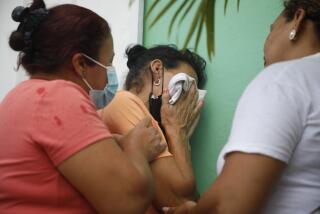3 Captives Slain, Argentine Rebels Suspect
- Share via
BUENOS AIRES — Two captured guerrillas who took part in a deadly attack on an Argentine army garrison in January charge that soldiers may have killed at least three other rebels after they had surrendered.
Preliminary testimony by Carlos Ernesto Motto, 21, and Claudio Omar Veiga, 25, was disclosed Thursday in several newspapers. The pair gave evidence on their roles in the Jan. 23 seizure of the La Tablada garrison, near Buenos Aires, in which at least 39 people, mostly the attacking guerrillas but also soldiers and police, were killed in a 30-hour battle.
That sudden violence by guerrillas of the far left, coming after three episodes of right-wing military rebellion, has worried many citizens of this country, which is expecting the first peaceful transition in 61 years from one elected civilian president to another after presidential elections scheduled May 14.
Initial testimony about the January attack and further details emerging from intelligence sources have somewhat eased concerns that the guerrillas were the vanguard of a new Argentine terrorist group. In fact, the operation appears to have been a poorly organized, prematurely executed assault by a motley band of ideologues, friends and hangers-on, although they were well armed in some cases.
Police and the army came under some criticism in military circles afterwards for the immense manpower and firepower they deployed. Critics suggested that elite commandos could have handled the 50 or so low-skilled attackers without the need to level buildings with artillery.
Security forces detained 13 guerrillas inside the base and arrested five more just beyond the camp. They and three known sympathizers are in custody for questioning.
Testimony Revealed
Motto said in his testimony to Federal Judge Gerardo Larrambebere that he had believed he was going to take part in an operation to prevent an attempted coup, following the three previous uprisings by disgruntled military officers since April, 1987.
“Our own constitution sets out the defense of the institutions and of democracy,” he was quoted as saying. While he apparently knew the general plan, he said the goal was to avoid fatalities.
Motto said that at the end of the battle, when the survivors agreed to surrender in the face of heavy bombardment, one of the group leaders, Francisco Provenzano, was alive. He said that a soldier told him later that Provenzano had escaped, when in fact his body was among those of the victims.
Veiga, for his part, also said he saw Provenzano, known as Pancho by his friends, with several soldiers. Veiga said that a short while later he heard a shot from a gun with a silencer. He also said that two young people, named Joaquin and Luis, had been captured alive and disarmed but later appeared with Provenzano on a list of dead.
Veiga said that two days before the attack, he had gone to a meeting of a small left-wing group that calls itself All for the Fatherland. At the meeting, he said he was told what was going to happen and was shown some rifles. He said that he tried to go home, saying he needed to be up early but was not allowed to leave. He was given instructions in using a Mauser rifle.
The Argentine media have reported with concern that the leader of the attack at La Tablada was Enrique Gorriaran Merlo, who headed the most effective left-wing guerrilla movement in Argentina in the 1970s, the People’s Revolutionary Army. The assaults of Gorriaran’s group and that of another rebel band, the Montoneros, led to a period of state counterterrorism that claimed thousands of lives here in the late 1970s.
Rumors had surfaced since the La Tablada assault that some of the captured surviving attackers had been executed.
Asked about the allegations, Atty. Gen. Andres D’Alessio said Thursday that two prosecutions had been instituted for ill-treatment of detainees.
More to Read
Sign up for Essential California
The most important California stories and recommendations in your inbox every morning.
You may occasionally receive promotional content from the Los Angeles Times.












